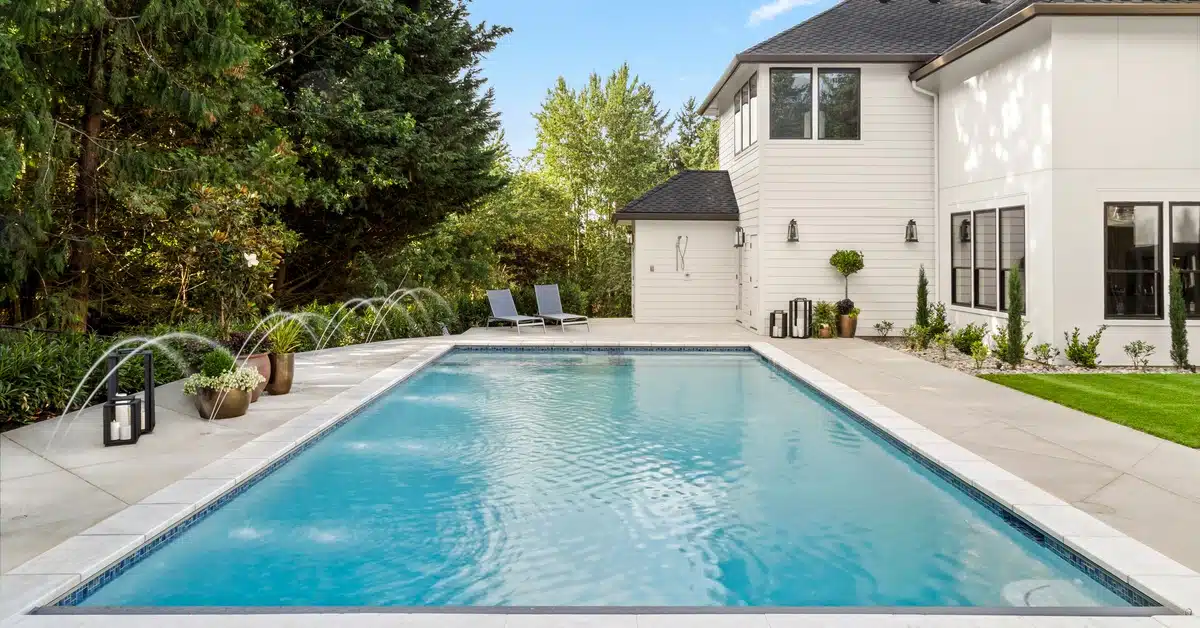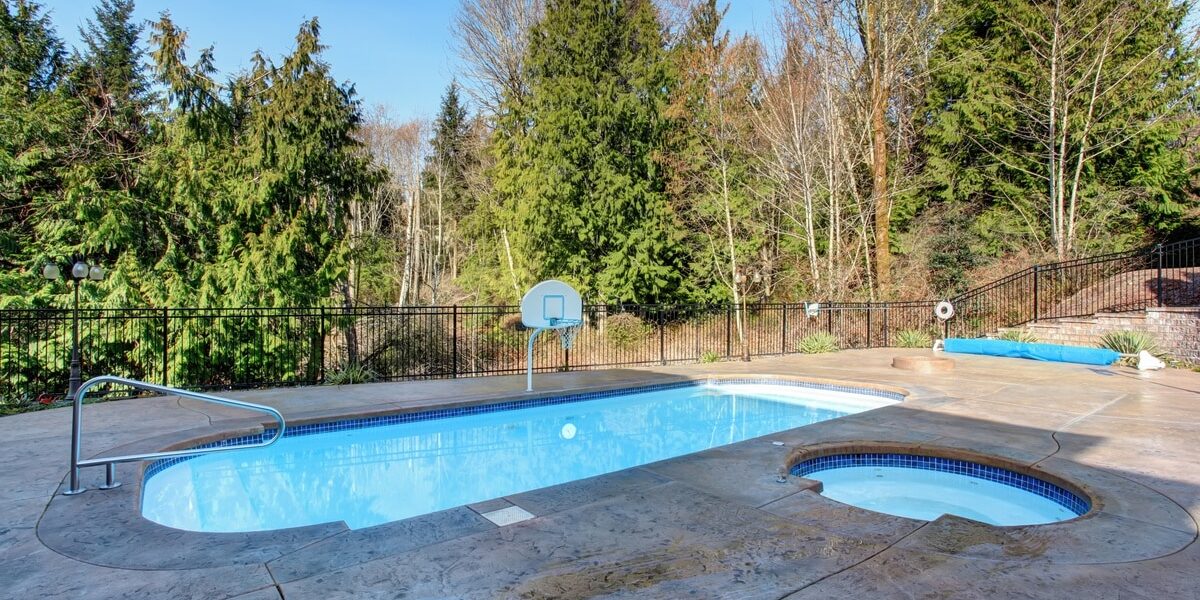Building a pool is a major investment that can elevate your home’s value and transform your outdoor space into a hub for relaxation, exercise, and entertainment. While there are plenty of decisions to make throughout the pool construction process, few are as critical as selecting the right materials. This decision will directly impact your pool’s lifespan, aesthetic appeal, and the amount of maintenance you’ll need to perform over time.
To help you make an informed choice, we’ve created the ultimate guide to choosing the best pool materials for you. Below, we’ll walk you through the most common options, taking an in-depth look at their properties and weighing their pros and cons.
Common Pool Materials
When it comes to pool construction, there are two materials that dominate the market today. These are concrete and vinyl, each offering unique benefits and considerations. Understanding how these materials stand up in terms of durability, maintenance, and design flexibility is key to choosing the right one for your pool.
Concrete
Concrete is the pinnacle of luxury and customization in pool design. Builders start these pools by applying concrete, either spraying it (shotcrete) or pouring it (gunite), over a steel framework. Once the concrete hardens, it’s polished or finished, creating a robust structure that you can design in virtually any shape, size, or depth.
Concrete pools offer exceptional durability, often lasting decades with proper care. They’re perfect for homeowners looking to execute their unique vision, as they allow for limitless design possibilities. Whether you’re imagining ornate tiling, dramatic curves, or a naturalistic lagoon-style pool, concrete provides the flexibility to bring those ideas to life.
Vinyl
Vinyl pools are another popular option, often chosen for their affordability and ease of installation. Builders stretch a vinyl liner over a preconstructed frame, typically built using steel, aluminum, or polymer panels. This creates a smooth and customizable pool interior.
One of vinyl’s standout features is its user-friendly surface, offering a soft and smooth texture underfoot. Vinyl also comes in a variety of colors and patterns, enabling you to create a stylish pool design on a modest budget. For those who want a pool with quick installation and manageable costs, vinyl is an appealing choice.

Key Considerations When Choosing Pool Materials
Your decision goes far beyond just appearances. Several critical factors should guide your selection to ensure your pool meets both your practical needs and personal preferences.
1. Cost
For the average homeowner, cost is often a major factor. Concrete pools tend to be the most expensive option due to their labor-intensive construction process and high-quality materials. While they may require a larger initial investment, they’re often seen as a value-adding feature that offers long-term enjoyment.
Vinyl pools often come with a lower price tag. With a relatively simple installation process, they’re a cost-effective way to achieve an attractive and functional pool without breaking the bank. Keep in mind, however, that you will need to replace vinyl liners every five to nine years, adding to the long-term cost.
2. Durability
Durability is essential for pool materials, as wear and tear from consistent use and exposure to the elements can take a toll over time. Concrete pools are extremely durable and can withstand harsh weather and heavy usage, making them an excellent long-term investment. However, they are prone to cracking, especially in regions that experience temperature fluctuations, and may require resurfacing every 10 to 15 years.
Vinyl liners are less durable by comparison. They are susceptible to tears, punctures, and gradual fading over time. High-quality liners can offer several years of use when properly cared for, but even with the best maintenance, you will eventually need to replace them.
3. Maintenance
The amount of maintenance you’re willing to take on is another important factor. Concrete pools tend to require significant upkeep due to their porous surface. Regular cleaning, resurfacing, and chemical treatments are necessary to prevent algae buildup and preserve the pool’s structural integrity.
By contrast, vinyl pools require less demanding maintenance—but they still need care. You must protect the liner from damage caused by sharp objects or excessive wear. Vinyl liners can also fade after prolonged exposure to sunlight and chemicals, so routine maintenance and gentle cleaning methods are essential.
4. Design Flexibility
If you’re looking to create a pool that’s truly one of a kind, concrete offers unmatched flexibility. It enables you to design pools with intricate shapes, custom depth profiles, luxurious finishes, and detailed mosaics. Whether you want a modern, geometric design or a freeform, naturalistic look, concrete can accommodate your vision.
Vinyl pools also allow for customization but within a more limited range. You can select from various liner colors and patterns to match your style, but some design options, such as complex shapes or depths, may not be feasible with vinyl liners.
5. Environmental Impact
If sustainability is a priority, it’s worth considering the environmental footprint of your pool materials. Concrete pools require significant raw materials and energy for construction, making them less eco-friendly overall. However, their longevity can offset their initial environmental impact when properly maintained.
Vinyl pools present their own challenges in terms of sustainability. Plastic materials make up vinyl liners, and their short lifespan contributes to waste. This makes them less environmentally friendly than concrete.

The Pros and Cons of Concrete and Vinyl Pools
Every pool material comes with distinct advantages and drawbacks. Understanding these will help you assess which material aligns best with your goals and expectations.
Concrete Pools
Pros
- They’re extremely durable and long-lasting.
- There are unlimited design possibilities for custom shapes and finishes.
- They add significant value to your property.
Cons
- They’re expensive to install and maintain.
- Concrete is prone to algae growth due to its porous surface.
- They require ongoing maintenance, including resurfacing.
Vinyl Pools
Pros
- They’re affordable compared to concrete.
- The material provides a soft, smooth surface that’s gentle on swimmers.
- They are relatively quick and straightforward to install.
Cons
- The liners can become punctured, torn, or faded over time.
- Vinyl is less durable than concrete, resulting in periodic liner replacements.
- They offer less customization than concrete.
Making the Right Decision
Choosing the best pool materials depends on your specific needs, preferences, and long-term goals. A concrete pool might be the perfect choice if you’re dreaming of a fully custom design and are prepared for the maintenance commitment. Meanwhile, a vinyl pool could appeal to homeowners prioritizing a lower upfront cost and a more straightforward installation process.
Whichever material you choose, it’s important to work with experienced professionals who can guide you through the process and turn your vision into reality. At Gulf Coast Pool Consulting & Construction, we specialize in commercial and residential pool construction tailored to your lifestyle and aesthetic preferences. Whether you want a luxurious retreat or a family-friendly oasis, we have the expertise and dedication to bring your dream pool to life.
For more information about working with us or to discuss your project, contact us today. Your backyard paradise is closer to reality than you think!

